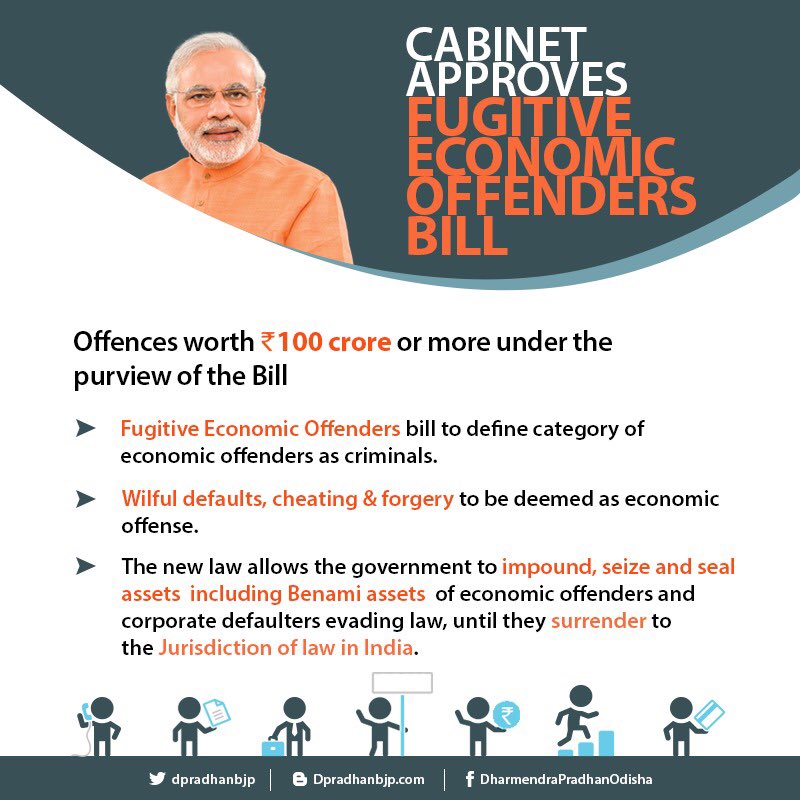The Bill empowers government to confiscate property of economic offenders and defaulters who flee India. The Bill seeks to deter economic offenders from evading the process of Indian law by fleeing the country.
Features of Bill :
-
Defines Fugitive Economic Offender: It defines fugitive economic offender as any individual against whom warrant for arrest in relation to economic offence has been issued and person has left the country and refuses to return to India to face criminal prosecution. The burden of proof for establishing that an individual is fugitive economic offender will be on authorities. The proposed bill will be applicable in cases where the value of offences is over Rs 100 crore.
-
It will allow Financial Intelligence Unit (FIU), the premier technical snoop wing under the finance ministry, to file an application for declaration of fugitive economic offender for confiscation of their assets.
-
Besides, it has provisions to override provisions of other existing laws.
-
Special Court: It establishes Special Court under the Prevention of Money-laundering Act (PMLA), 2002 to declare a person as FEO. The court will appoint ‘administrator’ to oversee confiscated property. It will be responsible for disposing of confiscated property and property will be used to satisfy creditors’ claims.
-
Attachment of property: It empowers director or deputy director (appointed under Prevention of Money-Laundering Act, 2002) to attach any property mentioned in application with permission of special court. These properties can be attached provisionally without the prior permission of the special court for 30 days. The attachment will continue for 180 days, unless it is extended by special court. If at the conclusion of proceedings, person is not found to be FEO, his properties will be released.
-
Bar on filing or defending civil claims: The bill allows any civil court or tribunal to disallow person declared FEO, from filing or defending any civil claim. Further, any company or limited liability partnership where FEO is majority shareholder, then promoter, or a key managerial person (such as MD or CEO) will also be barred from filing or defending civil claims.
-
Powers of director: The director or deputy director will have powers vested of civil court. These powers include entering a place on the belief that individual is FEO and directing searching of building or seizing documents.
-
Appeal: Under this law, appeals against orders of special court will lie before High Court.
Law Ministry Suggestions
- It wants Saving Clause to be incorporated in the Bill before it is introduced in Parliament.
- Saving clause provides for certain exception(s) in a statute. It enables repealed law to be in force with respect to some existing rights as provisions of the proposed bill has bearing on the provisions of existing laws.
- The existing laws under which such fugitive economic offender are tried include :
- Recovery of Debts Due to Banks and Financial Institutions Act (RDDBFI),
- Securitisation and Reconstruction of Financial Assets and Enforcement of Security Interest Act, 2002, (SARFESI) and
- Insolvency and Bankruptcy Code (IBC).

Why such law is needed?
- In the recent past, there have been instances of big-time offenders, including economic offenders, fleeing the country to escape reach of jurisdiction of Indian courts. For ex. Vijay Mallya, chief of erstwhile Kingfisher Airlines who owes over Rs 9,000 crore to various Indian banks, had fled India to escape legal proceedings in connection with the loans. Now Nirav Modi has fled India. Such cases have several deleterious consequences as it hampers investigation in criminal cases, wastes precious time of courts of law and undermines the rule of law of the country.
- The existing civil and criminal provisions in law are not entirely adequate to deal with the severity of the problem.
- It is, therefore, felt necessary to provide an effective, expeditious and constitutionally permissible deterrent to ensure that such actions are curbed.
- It may be mentioned that the non-conviction-based asset confiscation for corruption-related cases is enabled under provisions of United Nations Convention against Corruption (ratified by India in 2011). The Bill adopts this principle.
What Impact will this law have?
- The Bill is expected to re-establish the rule of law with respect to the fugitive economic offenders as they would be forced to return to India to face trial for scheduled offences.
- This would also help the banks and other financial institutions to achieve higher recovery from financial defaults committed by such fugitive economic offenders, improving the financial health of such institutions.
- It is expected that the special forum to be created for expeditious confiscation of the proceeds of crime, in India or abroad, would coerce the fugitive to return to India to submit to the jurisdiction of Courts in India to face the law in respect of scheduled offences.
Issue areas:
- From the provision in the Code of Criminal Procedure for attachment of the property of ‘proclaimed offenders’, to sections in Acts targeting smugglers, foreign exchange offenders and traffickers in narcotics, proceedings for forfeiture of property have been marked by shortcomings and procedural delays.
- Laws deemed draconian, such as the Smugglers and Foreign Exchange Manipulators (Forfeiture of Property) Act, 1976, have not exactly been a success.
- Experience has shown that disposal of confiscated assets is not easy, especially at a price sufficient to recoup losses or pay off all creditors.
- Under the Fugitive Economic Offenders Bill, confiscation is not limited to the proceeds of crime, and extends to any asset owned by an offender, including benami property. Such clauses are liable for legal challenge, especially if there are third party interests and doubts about real ownership. Care must be taken to draft a law that is free from legal infirmities from the point of view of fundamental rights and due process.